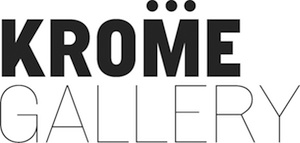•
MARIA LOBODA
IN THE AUTUMN THE ELECTRICITY WITHDRAWS INTO THE EARTH AGAIN AND RESTS
30.11.2010 – 15.01.2011
Opening: Saturday, 27 November 2010, 6 – 9 pm
•

click the picture to launch gallery
•
Versatile cultural references to literature, music and art alongside mysticism and folklore can be discovered in Maria Loboda’s work. A basic interest for the transformation of language and knowledge in specific objects as well as room ensembles crosses her work. In these themes Loboda refrains from focus on a certain era and instead investigates as a researcher throughout several fields. Loboda engages with the condensation of cultural history in artefacts and how they may materialise in our time.
In the first solo exhibition of Maria Loboda in the Krome Gallery, distinct powers and energies take effect. The examination of the sculptural power of language and writing system, the energy of forms, objects and materials, as well as their states and transformation, crosses the exhibition as fundamental topics. The title “In the autumn the electricity withdraws into the earth again and rests” is extracted from the Chinese I-Ching, the “Book of Changes”. In it, a central philosophy is the fundamental attempt to understand the world as a whole, which can adopt a variability of forms and states. The exhibition assembles new and recently developed work requiring metaphysical comprehension. As in previous works, Maria Loboda has followed the vital spirit of objects, their unconscious symbolism and poetic power.
The most spacious yet most invisible work “The totality of everything that exists” (2010) centres around the term of “universe.” A majority of the exhibition space has been painted in broken white. Derived from the hexadecimal RGB-value #FFF8E7, generated by scientists in 2002 during the spectral analysis of star galaxies in attempt to calculate the “colour of the universe,” Loboda produced and coated the gallery walls in a unique hue in order to bring together the cosmos and white cube.
This intervention is broken by “Walldrawing (arsenic, cyanide, mercury, lead)”, a wall drawing of colourful, non-objective forms and structures, drawn from the patterns of the Wiener Werkstätte. The appearance of beauty in this room's ornamental pattern is deceptive. The paints in use - Schweinfurter green, Naples yellow, Prussian blue or vermillion - contain the toxic elements arsenic, cyanide, mercury and lead.
Similar themes move through the new work “Ah, Wilderness”. This installation consists of three plants, hanging from the ceiling in baroque conjunction, though their wild behaviour outside the space could be described as antagonistic. The exhibited tree species cedar, pine and birch exist independently and without human intervention on the existence in their particular monocultures.
Further on Loboda has placed a monolithic, leather-covered writing desk in the gallery space. Appropriate to the title “Tasks abandoned before completion” (2010), the function of this abandoned workplace has been stripped as it solely remains a symbolic locality lacking the potential for concentration or intellectual work. In absurdity it seems only to be created for tasks that will never be completed and people who will never use it. On its leather cover remains a mark of a removed object, which is subsequently echoed on the opposite wall.
The divan bed titled “…this overelaboration of patterns leads to the unpleasant effect of four diverse elements without relationship or union with one another. From the distance the details fuse into a grey indistinct blur…” brings together swaths of suit fabric in disharmonious combination.
The work “Theme and Variation” (2010) consists of two copper engravings from the 18th century with architectural drawings of a temple complex, both in intact and destroyed states. As with a musical theme and its variation, Loboda presents this confrontation as a suggestion not to inevitably perceive the second drawing as destruction or potentially inferior, but plainly as another state of the same situation.
Thomas Thiel
Translation by Jules Gaffney.
